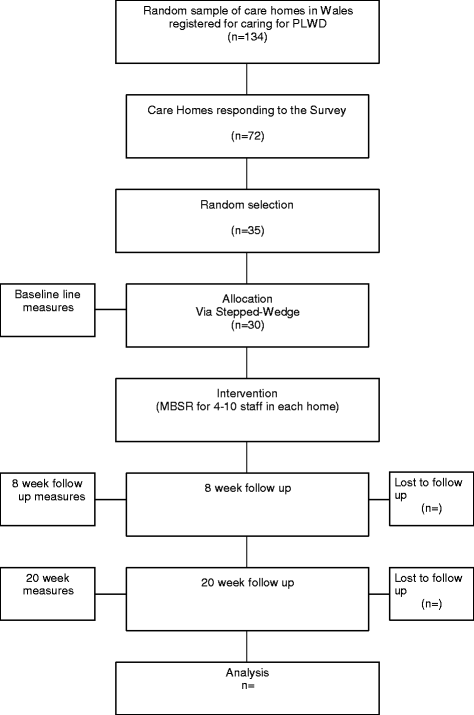Alleviating staff stress in care homes for people with dementia: protocol for stepped-wedge cluster randomised trial to evaluate a web-based Mindfulness- Stress Reduction course
- PMID: 26691663
- PMCID: PMC4687382
- DOI: 10.1186/s12888-015-0703-7
Alleviating staff stress in care homes for people with dementia: protocol for stepped-wedge cluster randomised trial to evaluate a web-based Mindfulness- Stress Reduction course
Abstract
Background: There has been continuing change in the nature of care homes in the UK with 80 % of residents now living with some form of dementia or memory problem. Caring in this environment can be complex, challenging and stressful for staff; this can affect the quality of care provided to residents, lead to staff strain and burnout, and increase sickness, absence and turnover rates. It is therefore important to find interventions to increase the wellbeing of staff that will not only benefit staff themselves but also residents and care providers. Mindfulness training is known to be effective in treating a variety of physical and mental health conditions.
Methods and design: The study uses mixed methods centred on a stepped-wedge cluster randomised trial. Thirty care homes in Wales are implementing a brief web-based mindfulness training course, starting in random sequence. Four to ten consenting staff from each facility undertake the course and complete validated questionnaires at baseline and after eight and 20 weeks. We shall also interview a stratified sample of ten trained staff and analyse the transcripts thematically. The primary outcome is stress; secondary outcomes include job satisfaction, attitudes towards residents and sickness absence rates.
Discussion: With increasing numbers of people living with dementia in care homes and causing stress in their carers, it is important to evaluate support strategies for staff. Mindfulness-based therapies may be of potential benefit and need detailed examination.
Trial registration: ISRCTN registry. ISRCTN80487202. Registered 24 July 2013.
Figures
References
-
- Jennings B. A life greater than the sum of its sensations: ethics, dementia and quality of life. In: Albert SM, Logsdon RG, editors. Assessing quality of life in Alzheimer’s disease. New York: Springer Publishing Company; 2000. pp. 165–178.
-
- Society A’s. Dementia 2014: opportunity for change. London: Alzheimer’s Society; 2014.
-
- Society A’s. Low expectations: attitudes on choice, care and community for people with dementia in care homes. London: Alzheimer’s Society; 2013.
-
- Prince M, Prina M, Guerchet M. World Alzheimer Report 2013: journey of caring – analysis of long-term care for dementia. London: Alzheimer’s Disease International; 2014.
-
- Lievesley N, Crosby G, Bowman C, Midwinter E. The changing role of care homes. London: BUPA and Centre for Policy on Ageing; 2011.
Publication types
MeSH terms
LinkOut - more resources
Full Text Sources
Other Literature Sources
Medical



